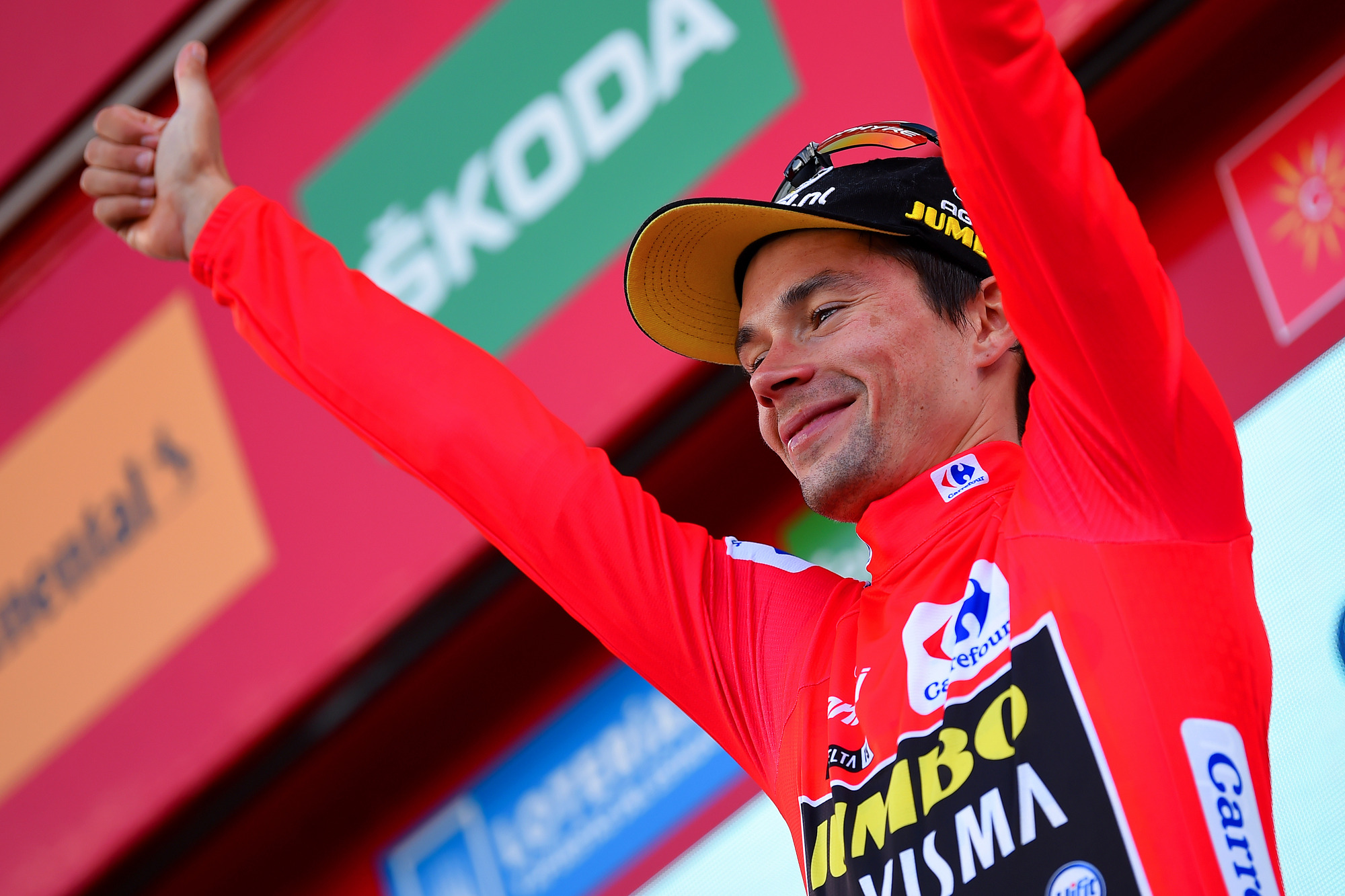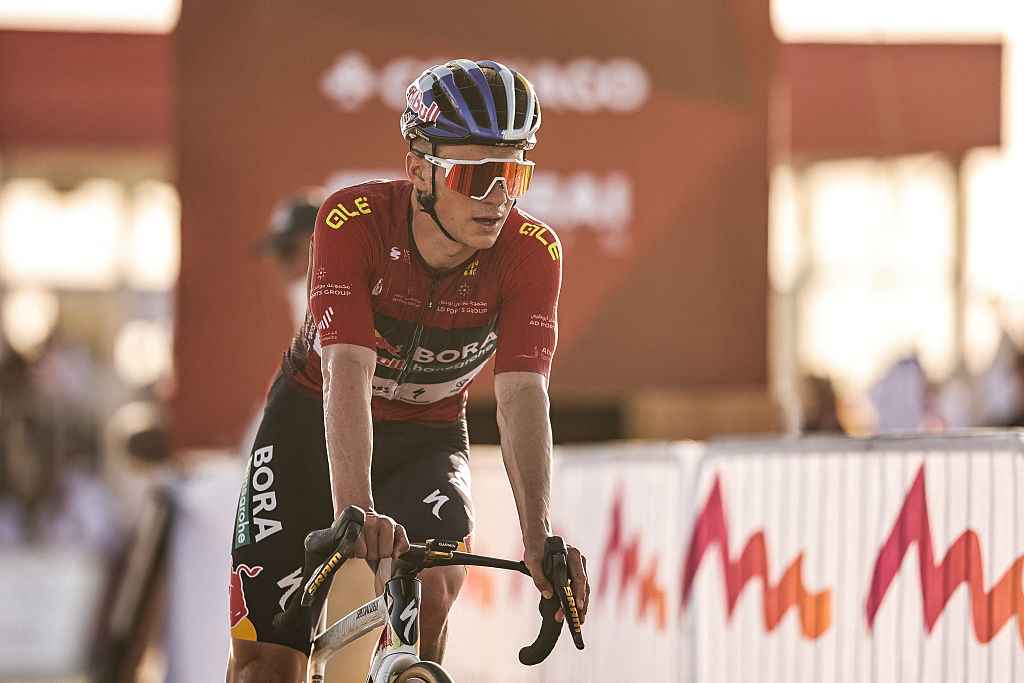Familiar scenario but a different approach for Roglic at Vuelta a España
'We had to play a far more dangerous game in the Giro,' says Engels

The latest race content, interviews, features, reviews and expert buying guides, direct to your inbox!
You are now subscribed
Your newsletter sign-up was successful
Primoz Roglic (Jumbo-Visma) might have felt a nagging sense of déjà vu as the Vuelta a España reached its midpoint on Wednesday. Ten days from the finish in Madrid, the Slovenian is more or less where he found himself at the corresponding point of this year's Giro d'Italia; buoyed by an emphatic time trial win and armed with a hefty advantage over his rivals for final overall victory.
The scenarios are broadly similar, but not entirely analogous. In May, for instance, Roglic was not wearing the maglia rosa at this juncture, though he had already held it for five days in the opening week. He was, however, the de facto leader of the 'virtual GC,' with a sizeable gap over men like Vincenzo Nibali and Richard Carapaz.
That meant his Jumbo-Visma team had a certain responsibility to control the race, but, weakened by the absence of Robert Gesink and the abandon of Laurens De Plus, they were loath to shoulder the entire burden. They famously allowed Carapaz to steal clear to snatch the pink jersey at Courmayeur, a manoeuvre that irrevocably altered the tenor of the race.
On this Vuelta, Roglic is already ensconced in the maillot rojo with a lead of 1:52 over Alejandro Valverde (Movistar), 2:11 on Miguel Angel Lopez (Astana) and 3:00 on Nairo Quintana (Movistar). Unlike at the Giro, where Jumbo-Visma were eager to farm out the maglia rosa at every opportunity, the team in Spain appears primed to go the distance. On Wednesday, Roglic's teammates spent most of stage 11 controlling affairs at the head of the peloton.
"In the Giro, it was more or less an obligation to do it [to lose the jersey]," Engels told Cyclingnews in Saint Palais on Wednesday. "The difference here is that we've taken the jersey on the Wednesday of the second week, whereas at the Giro we took the jersey on the first day. With the team we have here, we shouldn't be afraid to defend the jersey and try to keep it until the end. But on the other hand, that's not the main goal. The main goal is the jersey in Madrid."
Roglic is surrounded by a very different team on this Vuelta, with Sepp Kuss the only rider from his Giro supporting cast to line out alongside him in Spain. The pool of climbing talent on the Vuelta roster is considerably deeper. Steven Kruijswijk was an early abandon on this race, but the team has been able to absorb the loss far better than they did when De Plus was forced out at a similar juncture on the Giro.
Kuss, Gesink, and Neilson Powless all caught the eye with their aggression during Sunday's short but demanding leg in Andorra, while George Bennett has been a model of consistency thus far. On the flat, Tony Martin and Lennard Hofstede complete a formidable line-up, arguably the strongest in the race.
The latest race content, interviews, features, reviews and expert buying guides, direct to your inbox!
"I think especially uphill, the team is stronger at the Vuelta, I think for sure you can say that," Engels said. "And because of circumstances of course. We didn't have Robert in the Giro and Laurens had to abandon, so that's a big difference.
"So far, we've always been able to give good support, and the stages have been really hard at this Vuelta already. For the moment things look good, and Primoz looks good, but the situation in the first week isn't necessarily going to be the situation in the second and third week."
Applying lessons from the Giro
A year ago, Simon Yates claimed overall victory at the Vuelta after digesting the harsh lessons of his exploits at the Giro, where he had led the race for two weeks only for his challenge to grind to a halt on the Colle delle Finestre, two days shy of the finish in Rome. Yates had been aggressive from the very outset of the Giro, but he cut his cloth more conservatively at the Vuelta and was rewarded with a maillot rojo in Madrid.
Engels is not entirely convinced that Roglic has any particular lessons to apply after his third-place finish at the Giro. Jumbo-Visma's tactics may have raised eyebrows, but they were, Engels maintains, born of necessity. Roglic's struggles in the third week, meanwhile, were caused by illness and, in the circumstances, salvaging a podium place was perhaps the upper limit of what he could achieve in the race's final days.
"Of course, you learn things, but the most important thing is that he experienced in the Giro to be in such a position: to be a race favourite, to be in the jersey," Engels said. "I think that's the most important thing, to be have been there before.
"But the situation here is totally different. We had to play a far more dangerous game in the Giro than we do here because we didn't have the support uphill at the Giro. He was isolated too early. And that forced Primoz and us to play a dangerous game – but we had to."
In Urdax on Wednesday evening, meanwhile, Roglic was, in his own self-contained way, bullish about his team's ability to defend his maillot rojo in the days ahead, starting with Thursday's punchy finale in Bilbao.
"We've shown already in the past stages that this is a strong team," Roglic said. "I don't think tomorrow's stage is more dangerous for me than the high mountains. Normally, I don't have any big problems with short and steep climbs. We need to be focused every moment and try just to do our best."

Barry Ryan was Head of Features at Cyclingnews. He has covered professional cycling since 2010, reporting from the Tour de France, Giro d’Italia and events from Argentina to Japan. His writing has appeared in The Independent, Procycling and Cycling Plus. He is the author of The Ascent: Sean Kelly, Stephen Roche and the Rise of Irish Cycling’s Golden Generation, published by Gill Books.
